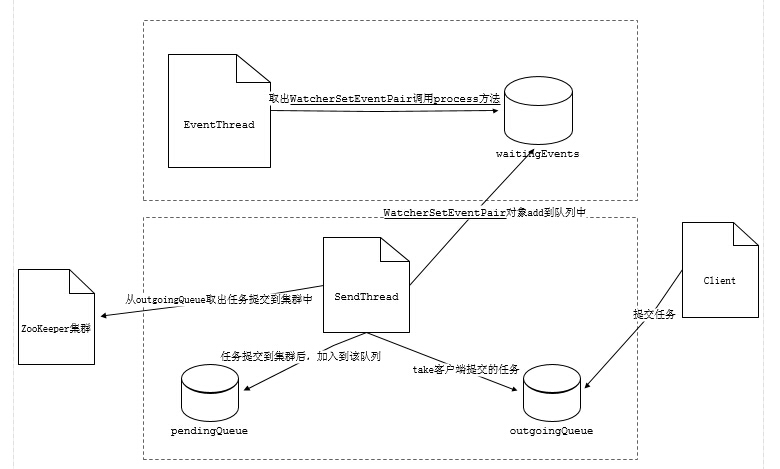1
2
3
4
5
6
7
8
9
10
11
12
13
14
15
16
17
18
19
20
21
22
23
24
25
26
27
28
29
30
31
32
33
34
35
36
37
38
39
40
41
42
43
44
45
46
47
48
49
50
51
52
53
54
55
56
57
58
59
60
61
62
63
64
65
66
67
68
69
70
71
72
73
74
75
76
77
78
79
80
81
82
83
84
85
86
87
88
89
90
91
92
93
94
95
96
97
98
99
100
101
102
103
| private void processEvent(Object event) {
try {
if (event instanceof WatcherSetEventPair) {
WatcherSetEventPair pair = (WatcherSetEventPair) event;
for (Watcher watcher : pair.watchers) {
try {
watcher.process(pair.event);
} catch (Throwable t) {
LOG.error("Error while calling watcher ", t);
}
}
} else {
Packet p = (Packet) event;
int rc = 0;
String clientPath = p.clientPath;
if (p.replyHeader.getErr() != 0) {
rc = p.replyHeader.getErr();
}
if (p.cb == null) {
LOG.warn("Somehow a null cb got to EventThread!");
} else if (p.response instanceof ExistsResponse
|| p.response instanceof SetDataResponse
|| p.response instanceof SetACLResponse) {
StatCallback cb = (StatCallback) p.cb;
if (rc == 0) {
if (p.response instanceof ExistsResponse) {
cb.processResult(rc, clientPath, p.ctx,
((ExistsResponse) p.response)
.getStat());
} else if (p.response instanceof SetDataResponse) {
cb.processResult(rc, clientPath, p.ctx,
((SetDataResponse) p.response)
.getStat());
} else if (p.response instanceof SetACLResponse) {
cb.processResult(rc, clientPath, p.ctx,
((SetACLResponse) p.response)
.getStat());
}
} else {
cb.processResult(rc, clientPath, p.ctx, null);
}
} else if (p.response instanceof GetDataResponse) {
DataCallback cb = (DataCallback) p.cb;
GetDataResponse rsp = (GetDataResponse) p.response;
if (rc == 0) {
cb.processResult(rc, clientPath, p.ctx, rsp
.getData(), rsp.getStat());
} else {
cb.processResult(rc, clientPath, p.ctx, null,
null);
}
} else if (p.response instanceof GetACLResponse) {
ACLCallback cb = (ACLCallback) p.cb;
GetACLResponse rsp = (GetACLResponse) p.response;
if (rc == 0) {
cb.processResult(rc, clientPath, p.ctx, rsp
.getAcl(), rsp.getStat());
} else {
cb.processResult(rc, clientPath, p.ctx, null,
null);
}
} else if (p.response instanceof GetChildrenResponse) {
ChildrenCallback cb = (ChildrenCallback) p.cb;
GetChildrenResponse rsp = (GetChildrenResponse) p.response;
if (rc == 0) {
cb.processResult(rc, clientPath, p.ctx, rsp
.getChildren());
} else {
cb.processResult(rc, clientPath, p.ctx, null);
}
} else if (p.response instanceof GetChildren2Response) {
Children2Callback cb = (Children2Callback) p.cb;
GetChildren2Response rsp = (GetChildren2Response) p.response;
if (rc == 0) {
cb.processResult(rc, clientPath, p.ctx, rsp
.getChildren(), rsp.getStat());
} else {
cb.processResult(rc, clientPath, p.ctx, null, null);
}
} else if (p.response instanceof CreateResponse) {
StringCallback cb = (StringCallback) p.cb;
CreateResponse rsp = (CreateResponse) p.response;
if (rc == 0) {
cb.processResult(rc, clientPath, p.ctx,
(chrootPath == null
? rsp.getPath()
: rsp.getPath()
.substring(chrootPath.length())));
} else {
cb.processResult(rc, clientPath, p.ctx, null);
}
} else if (p.cb instanceof VoidCallback) {
VoidCallback cb = (VoidCallback) p.cb;
cb.processResult(rc, clientPath, p.ctx);
}
}
} catch (Throwable t) {
LOG.error("Caught unexpected throwable", t);
}
}
}
|
